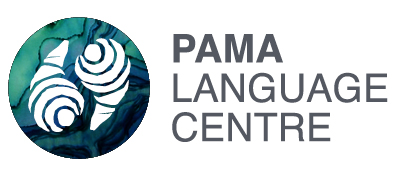Guugu Yimithirr Lesson 2
Ngayu – the word for “I”
In this lesson we’ll learn to say something about ourselves. First we need the word for “I”.
ng… ngayu
Watch, Listen and practice this yourself.
ng… ngayu – “I”
In the video, Lillian Bowen first says the ng-sound, and then ngayu. English speakers might not be used to saying words that begin the ng-sound. When we say the ng-sound, we mean the sound in “singer”, not the sound in “finger” Most people say “singer” without an audible “g”.
Responding to a greeting –Ngayu ganaa
In the first lesson we learned a greeting and a response:
Nhundu wanhtharra?
Ganaa!
The response can be a bit longer than the single word ganaa. Sometimes people say “I’m fine”
A bit more
The little word”I” is a personal pronoun. Personal pronouns are words we say instead of people’s names. We say “I”, “me” and “my” instead of repeating our own name; we say “you” and “your” instead of repeating the name of the person we’re talking to. Other English personal pronouns are “she”, “he”, “we”, and “they”. The pronoun “it” refers to a thing.
Ngayu ganaa – “I’m fine”
Watch, Listen and practice this yourself.
Let’s practice saying the ng-sound at the beginning of the word ngayu. It’s the same sound as the last sound in “sing”. If you have trouble saying “Ngayu” you could try saying
sing … ngayu
singayu
a few times and then taking away the “si-” at the beginning.
Let’s try again.
Remember
“ng” – at the beginning of a GY word is always like “ng” sound at the end of “sing”.
Watch, Listen and practice this yourself.
Introducing yourself
The Guugu Yimithirr word for “name” is gadil.
There is an old way of introducing yourself, and a new way. We will learn the new way first. The old way will be explained later in this lesson.
We’ll practice with the English gadil “Agnes”, so we easily see the name in the sentence.
Ngathu gadil Agnes – “My name is Agnes”
Watch, Listen and practice this yourself.
Ngathu is the word for “my”. It contains the ng-sound at the beginning, and the special GY th-sound that is not the same as the English TH. We practiced the Guugu Yimithirr TH in the previous lesson.
From Lesson 1
th – tongue between teeth
Usually no word for “am”, “are”, “is”
You notice that we don’t say “My name IS Agnes”. We just say say “My name Agnes”. Those of us who only speak English think it’s natural to say “is”, but it works just as well to have a language without that little word.
Notice
No GY words for is, am, are
The old way of saying “My name is…”
In old days, people used to say something that translates as “I name…”, not “My name…”. The reason is that “my” is an ownership word, and in old Guugu Yimithirr people didn’t say they owned things unless it was a thing that could be given away. So they tended to speak like this:
I head (meaning “my head”)
I name (meaning “my name”)
The thinking behind this was that my head is not a thing that I own. I am my head. And I am my name. This makes at least as much sense as the English expressions. An important thing about learning a Bama language is that we discover a different way of thinking.
So now we can introduce ourselves in the old way:
A bit more
The linguistic words for a thing that you can’t give away is “inalienable possession”. A thing you can give away is an “alienable possession”. In old Guugu Yimithirr your name was part of you so it was an inalienable possession.
“Bama” means “person, man”; today it is the word Guugu Yimithirr and other First Nations in the region use to refer to themselves.
Ngayu gadil… – “My name…”
Watch, Listen and practice this yourself.
Why is there an old way and a new way of introducing yourself? Maybe it is a change influenced by English. Guugu Yimithirr has been an oppressed language since the 1870’s when the Wangarr (white people) invaded. But it’s also possible that Guugu Yimithirr people always had different ways of introducing themselves in their own dialects.
SUMMARY OF LESSON 2
We can respond to a greeting with “Ngayu ganaa.”
You can introduce yourself by saying either “Ngathu gadil…” (my name) or “Ngayu gadil…” (I name).
Usually there’s no word for “am”, “are”, “is”.
WORDS IN LESSON 2
ngayu – “I”
ngathu – “my”
gadil – “name”
bama – ‟person”, “man”; today it often means “First Nation person”
wangarr – ”white person”; originally “white ghost”
LINGUISTIC WORDS IN LESSON 2
Personal pronoun: The group of words that we use instead of repeating names.
Inalienable possession: Something that is yours that you can’t give away, such as a body part, your name or a family member.
GRAMMAR FACTS IN LESSON 2
If a thing is inalienable (you can’t give it away) we often don’t say “my” (and we don’t say “his”, “her”, “our”, and so on).
There are small differences in grammar between old and new Guugu Yimithirr, such as the different ways of saying “My name…”.
Usually there are no words for “am”, “are”, “is”.
TEST YOURSELF
Now go to the Quizlet web site to practice these words:
https://quizlet.com/304573699/guugu-yimithirr-lesson-2-flash-cards/
